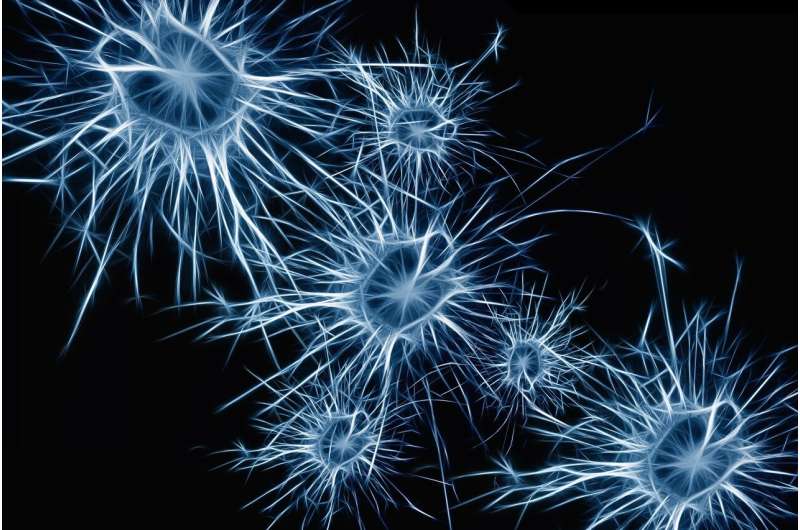This article has been reviewed according to Science X's editorial process and policies. Editors have highlighted the following attributes while ensuring the content's credibility:
fact-checked
preprint
trusted source
proofread
Researchers explore impact of stress, depression on astrocytes

The scientific literature is clear: chronic stress experienced in childhood increases the risk of illness in adulthood—everything from obesity and cancer to dependence and depression.
At the CRCHUM, Université de Montréal's affiliated hospital research center, Ciaran Murphy-Royal and his team are trying to prevent depression by working on astrocytes, a type of glial brain cell.
"Our aim is to understand the impact of stress on astrocytes, a type of non-neuronal brain cell, to determine if they could be a therapeutic target for depression, for example," said Murphy-Royal, an assistant professor of neurosciences at UdeM and specialist in cardiometabolic research.
To investigate the role of astrocytes in behavioral and depressive disorders associated with chronic stress, it's important to have a good study model in place first. And that's what Murphy-Royal and his team have developed.
In their laboratory, they've recreated stressful conditions by separating young mice from their mothers for a few hours a day over the course of 10 days. This lack of maternal care occurs during a critical period of brain development for rodents, the equivalent of 3 to 7 years of age in children.
But the effects of this stress are not immediately apparent. Instead, they appear two months later.
"Once they become young adults, the mice are more fearful and react more negatively when faced with undesirable events," Murphy-Royal said. "They clearly show signs of cognitive deficiency, be it in terms of learning or memory."
Sleep disorders linked to depression
In people with depression, doctors often observe associated sleep disorders.
The same thing happens in mice who have suffered from chronic stress. Murphy-Royal's most recent data suggests that, after stress, males are much more active during the day and at night have insomnia, while females are much less active and have hypersomnia, or sleep too much.
Using these mice, Ciaran Murphy-Royal and his colleagues investigated the effects of corticosterone, the stress hormone in rodents (the equivalent of cortisol, in humans), on the brain.
"In one of our studies, we were able to show that astrocytes play the role of a highly sensitive stress detector and relay information directly to the brain," said Murphy-Royal. "And what's remarkable is that, by inhibiting the stress receptors in these cells, the mice that were exposed to stress in childhood regain normal sleep and standard learning and memory capacities."
That finding marks a scientific advance, but for now, no clinical application. It can be accessed on the bioRxiv preprint server.
In humans, the challenge of counteracting the effects of chronic stress experienced at a young age has proven to be more complex than in rodents, particularly because stress receptors are found in a number of cells other than astrocytes.
A crossroads in research
Ciaran Murphy-Royal and his team are now at a crossroads: they're trying to understand what molecular changes take place and what signaling pathways are followed when astrocytes are activated by stress hormones.
To identify more precise therapeutic targets, the team is now considering collaborating with other researchers specializing in molecular biology.
"In the lab, we would like to evaluate the impacts that existing therapies, such as antidepressants to treat depression, have on astrocytes," said Murphy-Royal. "We suspect that the astrocytes are affected and that this could be an avenue to explore to improve the efficacy of these therapies."
His students are going even further: they would like to test psychedelic drugs (LSD, ketamine, psilocybin, and the like) and determine whether they alter the astrocytes' functioning and whether, ultimately, they have any effect on depression.
The astrocyte, a primary player
In a paper available on the arXiv preprint server, Murphy-Royal and two American colleagues at Washington University in St. Louis, Miss. offer a fresh perspective on the role played by astrocytes.
For a long time, scientists believed that these non-neuronal cells were secondary players, simply supporting the synapses.
But the scientific trio thinks that astrocytes are active partners that help neurons carry out their functions.
As essential detectors, they're sensitive to variations in levels of insulin, glucose, oxygen or corticosterone, for example, and are capable of adjusting the volume of neuronal activity accordingly.
More information: Ifeoluwa I. Adedipe et al, Astrocyte glucocorticoid signaling mediates cognitive impairment induced by early-life stress, bioRxiv (2022). DOI: 10.1101/2022.12.11.519598
Ciaran Murphy-Royal et al, Contextual guidance: An integrated theory for astrocytes function in brain circuits and behavior, arXiv (2022). DOI: 10.48550/arxiv.2211.09906



















